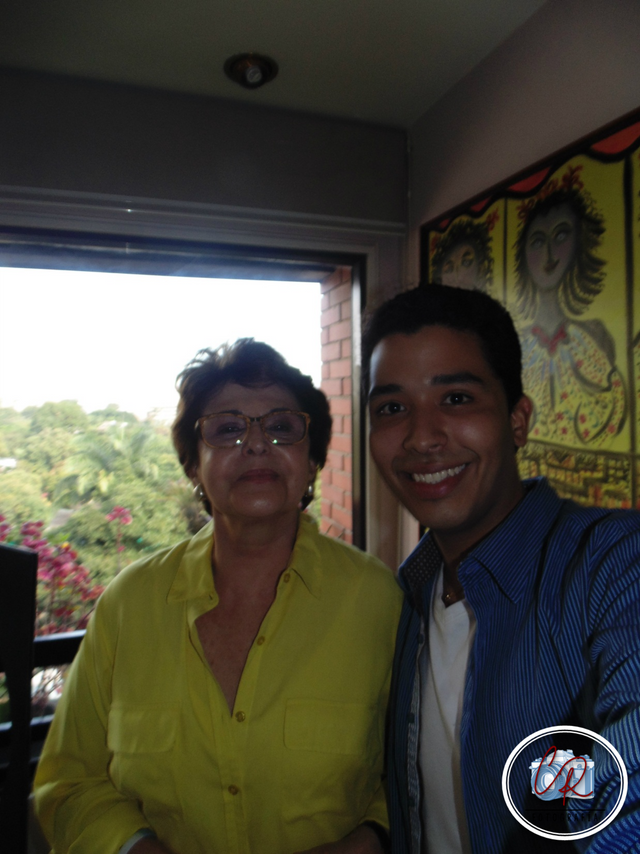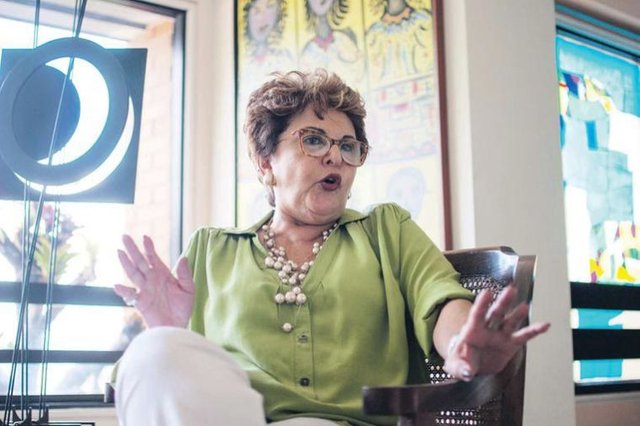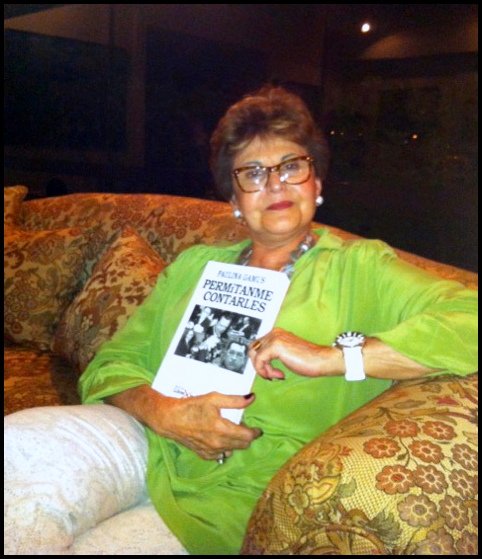Conversations with Paulina Gamus, Part I
Paulina Gamus, recognized Venezuelan politics. Minister of State for Culture during the government of Jaime Lusinchi and Vice Minister of Information and Tourism in the first term of Carlos Andrés Pérez.

The photography is my property

PAULINE WITHOUT FANATISM
The room is lonely and impeccable. Around the furniture a collection of photo frames decorates the space. The photo of her mother and the pictures of the marriage of two of her grandchildren are on an isolated table, explaining that the memories of special moments are exhibited there.
Several works of art harmonize the ambiance that contrasts between the brightness of the portraits, the clarity of the walls and the wooden floor. A painting stands out on one of the walls, is signed by Zapata and shows a simulation of the Venus de Milo and in the legend reads: "Let's give Paulina a hand".
She appears and opens the window, leaving the panorama of Ávila free, which she has had the privilege to enjoy for 27 years. He sits facing the mountain, leaving a trail of elegance and begins to remember.

YESTERDAY
After more than ten years of disappearing from the daily national event, she is amazed when a young person knows her, since she affirms that in Venezuela even a telenovela actor who stops appearing on the screen for five years, no one recognizes him anymore.
He was not fanatical in politics nor in the religious sphere. The only fanaticism he confesses to having had in his life was by the Navegantes del Magallanes. A fanaticism of such magnitude that led her, until the sun today, to take the speech from neighbors who were fans of the extinct Cervecería Caracas team (now Leones del Caracas).
Rome and Jerusalem are the cities of the world that he likes the most. He says that when he visits them he experiences a special connection that makes him feel as if he had lived in them in another life. Enjoy walking through Buenos Aires and New York. He can not live without music, his favorite song is Yesterday by the Beatles. "That I love," he says without hesitation when music is the topic of conversation.
Two years ago he published his book, Permítanme Contarles, a text where he recounts a series of anecdotes and his perception of the passage of forty years of civil life in Venezuela. He is currently writing for the newspaper El País in Madrid, in which he has published at least 18 articles.

OUR FIRST NEEDS
He was born on January 11 in the family house located in the San José Parish of Caracas. His father was Sirius and his Greek mother. They did not get into politics because of what Paulina calls "double strangeness," first, they were not born in the country and they were also Jews. They lived with the fear of being persecuted.
He studied primary school at the Moral and Luces Jewish School, where professors belonging to Acción Democrática taught, who were vetoed in the government education system during the Marcos Pérez Jiménez dictatorship.
His initial wish was to be a Professor of History and Geography, and he even made diligences to enroll in the Pedagogical Institute of Caracas. He attended the fifth year of high school at the Andrés Bello high school, where he obtained the degree of Bachelor in Philosophy and Letters. Given that 95% of her classmates were inclined to study law at the university, she did not want to be the exception.
She graduated from the School of Law of the Central University of Venezuela, Leonardo Ruiz Pineda promotion of 1959. "I thought it was an exciting career," says lawyer Cum Laude enthusiastically.


The photography is my property
THE SPY
During the years of the Perez Jimenez dictatorship, National Security had a spies deployment throughout the national territory. The maximum house of studies of the country could not escape from the grip of the regime.
"The spy arrived with a raincoat, dark glasses and a felt hat," he laughs and continues, "besides, he did not appear on the list, he sat last and did not attend the exams."
"He smiled at everyone but he did not speak to anyone and nobody spoke to him," he remembers with grace. "That man was missing a sign that said he was a spy," he concludes.
He says, "If you did not get involved in politics, you felt like nothing happened." From those days he remembers that his sociology professor was Rafael Caldera when he arrived at university. The education system was very strict and when compared to the current one, he thinks that "we went from yesterday's rigor to today's relaxation".
Much later, a journalist with whom she did not have a good relationship accused her of having been a National Security spy.

By César R. Pinto.

